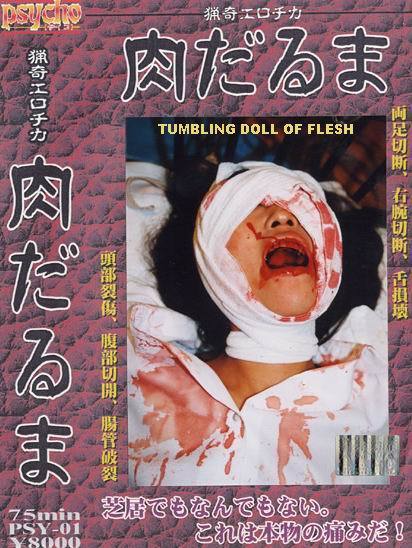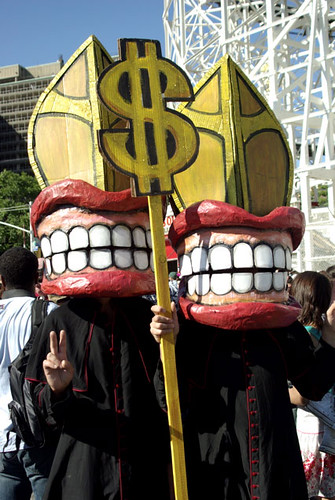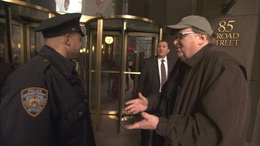Philosophy, Politics, Film, Religion, Music, and whatever happens to piss me off or intrigue me.
Monday, September 20, 2010
Thursday, September 9, 2010
Niku Daruma
 On the fringes of cinema, there have always been films that push the boundaries of what society has deemed decent and acceptable for the public to view. Such films depict graphic violence, unsimulated sex, and other taboos that regular people dare not speak of, with some movies including all of the above. Here in the United States, films like August Underground and Faces of Death gain an audience in the underground circuit and obtain recognition mainly through notoriety and word-of-mouth. But across the Pacific, Japan has its own brand of extreme cinema, with an emphasis on combining both pornography and unapologetically brutal violence. Niku Daruma (aka Tumbling Doll of Flesh or Psycho: The Snuff Reels) is such a film, even though it may seem tame to fans of extreme movies.
On the fringes of cinema, there have always been films that push the boundaries of what society has deemed decent and acceptable for the public to view. Such films depict graphic violence, unsimulated sex, and other taboos that regular people dare not speak of, with some movies including all of the above. Here in the United States, films like August Underground and Faces of Death gain an audience in the underground circuit and obtain recognition mainly through notoriety and word-of-mouth. But across the Pacific, Japan has its own brand of extreme cinema, with an emphasis on combining both pornography and unapologetically brutal violence. Niku Daruma (aka Tumbling Doll of Flesh or Psycho: The Snuff Reels) is such a film, even though it may seem tame to fans of extreme movies.The film begins in a dark room, with a man sitting watching the gorey aftermath of an ax homicide on a small television set (according to many other movies about psychopaths, this is shown to establish his craziness). Next, we are shown several men picking up a female porn star, and they are taking her to the set (aka some guy‘s shitty apartment). The scene they are shooting gradually becomes more extreme, as they start off with normal foreplay and move into rope-bondage. It is when they introduce her to an enema that she objects and wants to take a break. While going to the restroom, one of the men come in and beat her over the head with a baseball bat. The three men tie her to the bedposts with ropes, and proceed to perform multiple amputations and other graphic acts (which would lose their impact with curious readers if I mention them).

Niku Daruma is directed by Tamakichi Anaru (his surname actually translates to “anal”, which is very telling, considering Niku), who has made other gore-soaked fares as Suicide Dolls and Women’s Flesh: My Red Guts. He is also known for his pornographic work, with such titles as Mother and Daughter: Spit-Swapping Seduction and Near Relation Lesbian Kiss. Anaru no doubt has a peculiar taste when it comes graphic sexuality, and he incorporates this into Niku and has the narrative (or lack-there-of) take a violent turn for the worse in this respect. Although he does, in a way, cater to the wishes of gorehounds and fans of obscure extreme cinema, Anaru has clearly made this film just for the sake of being shocking and perverse.
I must admit, I expected more going into this film. Having read other reviews for Niku, I was awaiting the chance to be shocked and disturbed. However, what I got was a 69-minute film that was a 40-minute porno (a rather boring one at that) and a 20-minute faux snuff film. I probably would not have minded this, were it for how painfully long and unnecessarily tedious the snuff portion of the film was. It also did not help that there were no subtitles, which makes you care about the characters even less. Niku Daruma has a very limited release here in the United States, and can probably only be found on eBay or the darkest corners of the internet. If you are into this sort of movie and you have a morbid curiosity to see it, then go for it (if you can find it). But Niku Daruma is too painfully long considering its short running time and has incredibly sub-par effects that I cannot actually recommend it to anyone.
Wednesday, September 1, 2010
Capitalism: A Love Story
 The always controversial documentarian Michael Moore has been exposing the corruption, greed, and down-right inconsideration for the lower and middle class of America's elite for over twenty years now. Since the people who tend to support the actions and ideology behind the upper one percent are on the right side of the political fence, Moore has attacked the very basis for their position in Capitalism. Moore has even expressed that this is the film that he has been waiting to make since the beginning of his career (I'm paraphrasing). This is highly evident, as the problems of capitalism have been an underlying but influential factor in the issues discussed in his movies, even if he hasn't previously came right out and said it.
The always controversial documentarian Michael Moore has been exposing the corruption, greed, and down-right inconsideration for the lower and middle class of America's elite for over twenty years now. Since the people who tend to support the actions and ideology behind the upper one percent are on the right side of the political fence, Moore has attacked the very basis for their position in Capitalism. Moore has even expressed that this is the film that he has been waiting to make since the beginning of his career (I'm paraphrasing). This is highly evident, as the problems of capitalism have been an underlying but influential factor in the issues discussed in his movies, even if he hasn't previously came right out and said it.  Within the first twenty minutes, there is a montage of old-time circa-1950s footage, showing clips of the idealized yet unrealistic view of the nuclear family's American dream: dad working a factory job, mom shopping with a baby sitting in the shopping cart, the family on vacation. Over this, the narration states how things used to be good in the old days, when dad had a job that provided the family with everything they needed, mom could "work if she wanted to but didn't have to", and the middle class had a "love affair with capitalism". But soon enough, he mentions that not everything was perfect, and as long as people got to live the American dream, they would put up with "this and that", while showing clips of black men being hosed down and bombs being dropped. This is one of the more confusing parts of the film, in that I am not quite sure of what Moore is getting at. If this is the ideal version of capitalism, in which dad's job was enough to support a family and provide for their basic needs, then does he support this kind of economic system? Although he does show that things were not great for minorities and countries we had invaded at the time, this is somewhat overshadowed by the assertion that this capitalism was perverted when Reagan came into office. Moore comes dangerously close to insinuating that the 50s and 60s was a better time in American history, much like how conservatives think this was a time where family values, work ethic, and adherence to morals was at its peak, and we should therefore return to that mentality. But what they always fail to mention is the lack of rights and recognition that minorities, women, and even gays had, and this system really only benefited white middle-class males.*
Within the first twenty minutes, there is a montage of old-time circa-1950s footage, showing clips of the idealized yet unrealistic view of the nuclear family's American dream: dad working a factory job, mom shopping with a baby sitting in the shopping cart, the family on vacation. Over this, the narration states how things used to be good in the old days, when dad had a job that provided the family with everything they needed, mom could "work if she wanted to but didn't have to", and the middle class had a "love affair with capitalism". But soon enough, he mentions that not everything was perfect, and as long as people got to live the American dream, they would put up with "this and that", while showing clips of black men being hosed down and bombs being dropped. This is one of the more confusing parts of the film, in that I am not quite sure of what Moore is getting at. If this is the ideal version of capitalism, in which dad's job was enough to support a family and provide for their basic needs, then does he support this kind of economic system? Although he does show that things were not great for minorities and countries we had invaded at the time, this is somewhat overshadowed by the assertion that this capitalism was perverted when Reagan came into office. Moore comes dangerously close to insinuating that the 50s and 60s was a better time in American history, much like how conservatives think this was a time where family values, work ethic, and adherence to morals was at its peak, and we should therefore return to that mentality. But what they always fail to mention is the lack of rights and recognition that minorities, women, and even gays had, and this system really only benefited white middle-class males.*My biggest bone to pick with Capitalism, and Moore specifically, is a religious aspect that incorporates in the film. He interviews several priests, who claim that capitalism is an evil and use words like "eliminate" and "eradicate" in relation to capitalism and its supporters. Christianity is supposedly highly altruistic, always looking out for the better interests of the collective, and enterprise and greed are antithetical to Jesus' principles. Moore even claims that he wanted to be a priest, but he saw them as activists pushing for social reform. First of all, I find it strange that Moore only interviews Catholic priests. I find this ironic that they are put into this context of being the ones who support the lower class, when the Vatican is a very wealthy city-state, and the reason priests can't marry has historically been because their property would go to their families instead of the Church. That sounds a lot like a product of capitalism to me. I do understand that these priests are a minority, much like the few white churches that helped out during the Civil Rights movement and the anti-war protests during the Vietnam War. But Christianity, and any other religion for that matter, has never been the poster child for social progress and reform**. Time has showed us that Christianity has consistently clung to tradition and a contradictory value system that is slowly changed in terms of peripheral beliefs as a modern world demands reform. So Moore saying that the teachings of Christianity has been at the forefront of fighting for reform and the average worker is fallacious, especially when homosexuality, a woman's right to her body, and even contraception and condoms are still condemned by most denominations. Moore fails to acknowledge the Christian/imperialist complex that is at work in America, and that he has been blaming for the past twenty years.
 However, these problems occur in the first half of the two-hour plus film. After an hour of anecdotal cases of home foreclosure and seizure, mild religious pandering, and personal stories, he finally gets to the real issue that is on everyone's mind: the financial crisis. Chronicling the beginning of the real estate loan scam that eventually and tragically ended up crashing the economy, Moore doesn't hesitate to point fingers. This is no doubt the most powerful and enraging part of the documentary, in that it shows a corporatist scam that was flawed and rotten from its very foundation.
However, these problems occur in the first half of the two-hour plus film. After an hour of anecdotal cases of home foreclosure and seizure, mild religious pandering, and personal stories, he finally gets to the real issue that is on everyone's mind: the financial crisis. Chronicling the beginning of the real estate loan scam that eventually and tragically ended up crashing the economy, Moore doesn't hesitate to point fingers. This is no doubt the most powerful and enraging part of the documentary, in that it shows a corporatist scam that was flawed and rotten from its very foundation.Aside from the few problems I aforementioned, this is a compelling documentary that Moore has been working towards his whole career, whether he realizes it or not. It may not be the smoking gun that the left has been waiting for to start what the right refers to as a "commie revolution", but it will no doubt get people thinking, even if they their concern ceases the beginning of the next work day. While exposing the corruption that capitalism can potentially (and maybe even eventually) lead to, he simultaneously calls for major economic reform, namely a form of socialism, even if he doesn't say it out loud. If you hold onto the idea that America is 'great' because of capitalism, or that God wants it this way and the only alternative is a communist/socialist police state that persecutes Christians and is run by Jewish, Satanic, Catholic, homosexual, feminist, occultist, atheist (or maybe even aliens or lizards) bankers bent on world domination and destruction, then this will either enrage you or change your mind.
But I couldn't help but wonder what will become of Michael Moore now? He even states at the end of the documentary that he doesn't think that he can do this anymore. His reputation has gotten him to the point where he can no longer walk into the lobby of GM Headquarters and try to make an appointment with the CEO, like he did in Roger and Me. The second time around, in Capitalism, a security guard walks right up to him and the camera, trying to cover the lens with his hand while immediately recognizing Moore and telling him he can't shoot without permission. For Mike, it has gotten to the point where every white collar worker knows who he is and is constantly looking out for him, because of the attention he attracts and the influence he may have.
 Maybe it is time for him throw in the towel, or at least get into producing and support like-minded people looking for social justice. Or maybe he can rip the next Republican president a new asshole while making the Weinsteins a shitload of money because they think his films won't cause an uprising within a population that is largely apathetic, numbed out on trash television, and whores of the system. But with a capitalist society like ours, can you blame them for the lack of optimism?
Maybe it is time for him throw in the towel, or at least get into producing and support like-minded people looking for social justice. Or maybe he can rip the next Republican president a new asshole while making the Weinsteins a shitload of money because they think his films won't cause an uprising within a population that is largely apathetic, numbed out on trash television, and whores of the system. But with a capitalist society like ours, can you blame them for the lack of optimism?*- This is not an admission of white guilt, nor am I saying that no white males get screwed over by capitalism
**- Again, there are always exceptions, and there is a minority that is progressive and has 'gotten with the times'
Labels:
capitalism,
documentary,
liberalism,
Michael Moore,
movies
Subscribe to:
Posts (Atom)